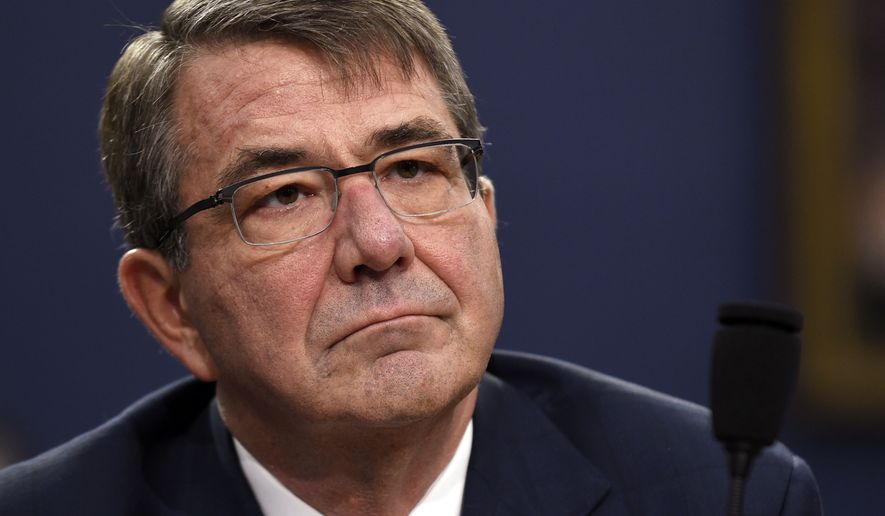Defense Secretary Ashton Carter on Monday declared a cyberwar against the Islamic State and its savvy techies, as analysts say the U.S. likely is trying to shut down the terrorist group’s encrypted messaging applications and hacking operations.
In what is the first acknowledged war conducted by U.S. Cyber Command at Fort Meade, Maryland, American Internet warriors are attempting to remotely shut down the Islamic State’s networks by overloading and crashing it computers.
It is a faceoff on a virtual battlefield: America’s vast technological power versus jihadi cyberterrorists.
“We’re trying to both physically and virtually isolate ISIL, limit their ability to conduct command and control, limit their ability to communicate with each other, limit their ability to conduct operations locally and tactically,” said Mr. Carter, using an acronym for the Islamic State.
“Cybercom itself was devised [in 2009] specifically to make the United States proficient and powerful in this tool of war,” he told reporters at the Pentagon.
In launching the hacking offensive, the military is taking on the most vaunted aspect of the Islamic State’s war machine: a maze of social media and Internet communication platforms that allows it to recruit foreign fighters and publish propaganda while commanding and communicating with forces who occupy land and commit atrocities across the Middle East-North Africa region.
In one example, the Middle East Media Research Institute has published video of Islamic State commanders directing suicide bombers from computer control rooms using GPS guidance and smartphones.
Mr. Carter was guarded in discussing exactly how Cyber Command, which is located with the National Security Agency and shares its commander, is attacking. He said that in some instances the Islamic State will not know why its systems are malfunctioning.
“I think we can describe some of the effects there, but because the methods we’re using are new, some of them will be surprising and some of them are applicable to other challenges that I described, other than ISIL, that we have around the world,” the defense secretary said. “It’s to our advantage to maintain the element of surprise with regard to conducting cyberoperations.”
The mission, Mr. Carter said, is to “disrupt ISIL’s command and control, to cause them to lose confidence in their networks, to overload their network so that they can’t function, and do all of these things that will interrupt their ability to command and control forces there, control the population and the economy.”
He added: “So this is something that’s new in this war, not something you would have seen back in the [1991] Gulf War, but it’s an important new capability and it is an important use of our Cyber Command and the reason that Cyber Command was established in the first place.”
Steven Stalinsky, MEMRI’s executive director, said one U.S. target should be the Islamic State’s hacking unit known as CyberCaliphate. The Islamic State says it has established a caliphate, or Muslim state, in Iraq and Syria.
CyberCaliphate is active mostly on an encrypted messaging application called Telegram, which can be downloaded through Apple’s iTunes and Google Play.
“I would presume that the U.S. will be going after ISIS online first of all by shutting down all its active accounts and active communication methods,” Mr. Stalinsky said, using another acronym for the Islamic State. “If they have any cybercenters known, I would imagine they will be targeted, as well as any known senior member of their hacking division.”
Disabling the Islamic State’s encrypted messaging systems could force the terrorists to move to old-school communications that are easier for the NSA to intercept.
“As we disrupt the ISIL communications via cyber or other methods, sometimes we do drive them to other means,” Mr. Carter said. “But it cuts both ways. Sometimes, those other means are easier for us to listen to. So by taking away some of the ways that they are used to operating, they’re protected and that they regard as an information sanctuary, drives them to other, including older technologies. And so one way or another, it is a very effective tool.”
Mr. Carter was to travel Monday to the West Coast for sessions with the executives of technology giants such as Microsoft and Amazon to discuss the increasingly complex, and dangerous, cyberworld and how terrorists use it.
“He can remind them of the threats of cyberattacks on their companies,” Mr. Stalinsky said. “These companies have a major interest in the U.S. government’s efforts to fight groups such as ISIS hackers, including the CyberCaliphate.
“This is a good opportunity for U.S. companies to be reminded of how much they actually depend on the government to help protect them from hacking groups, who will very likely step up their activity in the future as they have grown in numbers and strength. The companies and the government have a mutual interest in working together; each one needs the other,” he said.
The U.S. fought an unannounced cyberwar against Iran and its far-flung nuclear program. A destructive computer “worm,” developed jointly by the U.S. and Israel, infected Iran’s computer network and disabled centrifuges used to enrich uranium to weapons grade. Neither country has publicly acknowledged the covert action.
• Rowan Scarborough can be reached at rscarborough@washingtontimes.com.




Please read our comment policy before commenting.